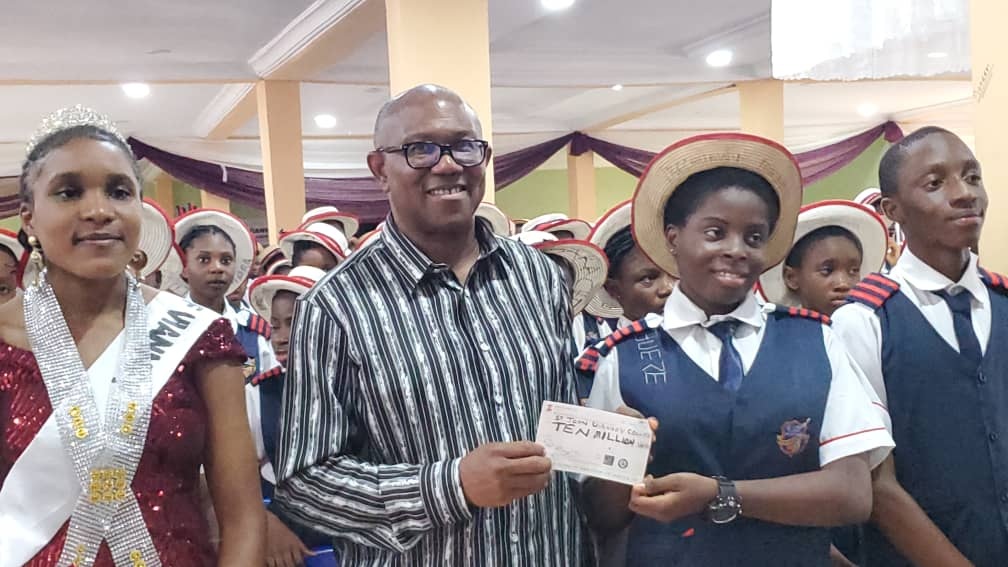In the complex landscape of Nigerian politics and development, education emerges as a pivotal factor for national progress.
This perspective was recently underscored by Mr. Peter Obi, former Labour Party presidential candidate and a prominent figure in the burgeoning opposition coalition preparing for the 2027 elections.
Obi’s reflections highlight a critical discourse on Nigeria’s developmental trajectory, emphasizing education over natural resources as the cornerstone of sustainable growth.
Education as the Most Critical Investment
During a visit to St. John Vianney Science College in Ukwulu, on Friday, July 4, 2025, Peter Obi celebrated the school’s triumph at the inaugural UK-Nigeria Debate Championship.
There, it outperformed leading secondary schools from both nations.
This victory was not just a win for the institution but a beacon of hope and pride for Nigeria.
Obi praised the students and faculty, describing their success as “a source of national pride and a shining example of what Nigerian youth can achieve when given the right foundation.”
To further support the school’s growth, he donated ₦10 million aimed at infrastructural development.
Obi’s emphasis on education is clear: “A sound learning environment remains essential if our children are to compete globally.”
His statement reflects a broader understanding that the quality of education and the environment in which it is delivered are fundamental to preparing Nigerian youth for international competitiveness.
By highlighting the students’ achievement, Obi underscores the potential of Nigerian youths to excel when properly nurtured.
Leadership and Vision in Education
The former governor also commended the school’s proprietor, Rev. Fr. Emmanuel Obimma, known as Fr. Ebube Muonso, for his visionary leadership.
Obi noted, “What Fr. Obimma is doing is exactly what the government should be doing,” pointing to the importance of dedicated leadership in fostering academic excellence and moral development.
This praise implicitly critiques the government’s failure to prioritize education adequately, lamenting that “resources are being wasted on frivolous displays of wealth.”
This is instead of the resources being channeled into critical sectors like education.
Nigeria’s Development Challenge: A Question of Priorities
Addressing reporters, Obi articulated a compelling argument about Nigeria’s underdevelopment.
Contrary to the popular belief that abundant natural resources guarantee wealth, he stated, “If oil made a country rich, Venezuela would be the richest country in the world.”
This observation draws attention to the paradox of Nigeria’s vast oil reserves juxtaposed with its persistent economic challenges.
Obi attributes the root cause of underdevelopment to poor investment in education, which he identifies as “the driver of development.”
The implication is profound: natural resources alone cannot catalyze national prosperity without a skilled, educated populace capable of innovation and effective governance.
Obi’s call for “deliberate and consistent investment in education” positions human capital development as the linchpin for Nigeria’s future.
Personal Commitment to Educational Advancement
Peter Obi’s commitment transcends rhetoric; he personally visits at least one school daily, driven by the conviction that “building humanity through education is the fastest way to transform society.”
His ongoing outreach reflects a hands-on approach to advocacy, reinforcing the message that societal transformation begins with empowering individuals through learning.
“I will be in another school on Monday and yet another on Tuesday,” he shared, emphasizing the urgency and continuity of this mission.
Obi’s philosophy that “If your life is not spent building others, then it’s a wasted effort” encapsulates his dedication to nurturing the next generation.
Contextualizing Obi’s Message in Nigerian Politics
Obi’s remarks come at a time when there is increasing public scrutiny over government spending priorities in Nigeria.
Many citizens and stakeholders have voiced concerns about the disproportionate allocation of resources towards non-essential expenditures at the expense of critical sectors like education.
This discourse resonates deeply within the Nigerian polity, where the quality of governance and development outcomes remain pressing issues.
As Nigeria approaches the 2027 elections, the emphasis on education as articulated by Obi may influence policy debates and electoral platforms.
His stance challenges political leaders to rethink development strategies and prioritize human capital as the foundation for national growth.
Conclusion
The Nigerian polity stands at a crossroads where the choices made today will shape the country’s future.
Peter Obi’s advocacy for education as the most vital investment offers a compelling blueprint for sustainable development.
By celebrating academic excellence, criticizing misplaced governmental priorities, and personally engaging with educational institutions, Obi highlights a path forward that centers on empowering the youth through quality education.
In a nation blessed with abundant natural resources yet grappling with developmental challenges, Obi’s message is clear:
true wealth lies not beneath the ground but within the minds and capabilities of its people.
For Nigeria to realize its full potential, deliberate, consistent, and visionary investment in education must become the nation’s foremost priority.







